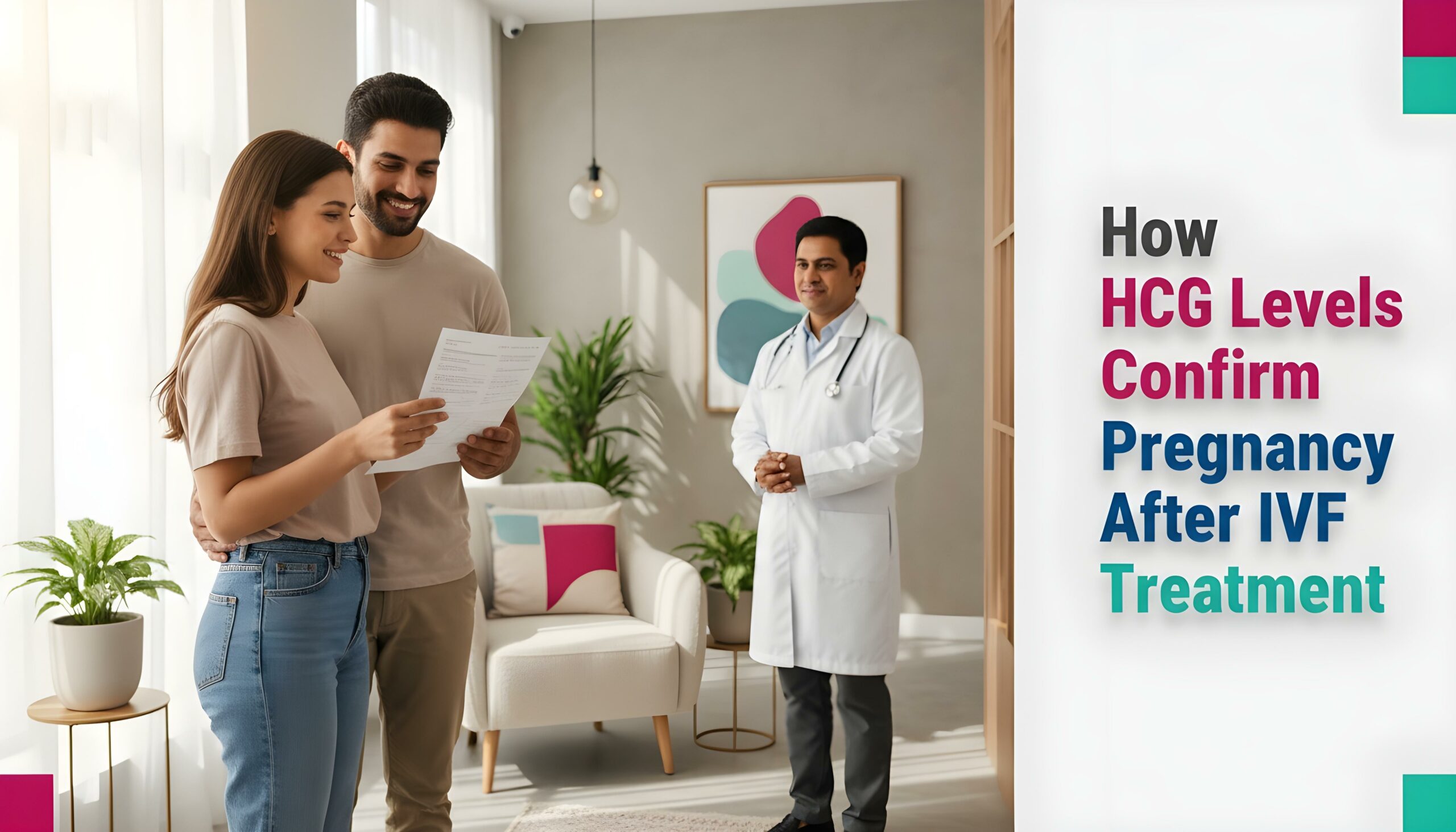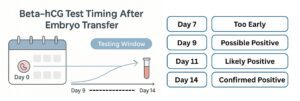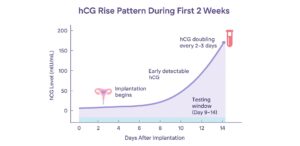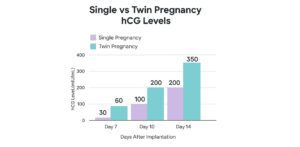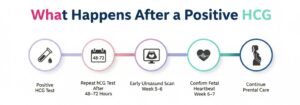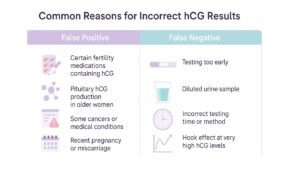This blog walks you through what hCG really means after IVF – from the moment it first appears in your blood to how its rise, fall, or fluctuation reflects what’s happening with implantation and early pregnancy. It explains normal and abnormal hCG patterns, what low or very high values can indicate, and how they relate to twins, miscarriages, or ectopic pregnancy. You’ll also see how hCG connects with ultrasound findings, why tests can sometimes be false-positive or false-negative, and what to expect step by step after a positive result. Above everything, it’s written to help you read your numbers with more calm, clarity, and hope during a very emotional part of your IVF journey.
Connect with Fertility World Specialists Today — Get a Free hCG & Early Pregnancy Evaluation After IVF
+91 9311850412 | Email- info@fertilityworld.in
Understanding hCG — The First Hormone That Confirms IVF Pregnancy
The two-week wait after your IVF cycle can feel like the longest time of your life. You feel like every little change in your body is a sign, and deep down, you just want to know, “Am I pregnant?”
That’s when hCG after IVF becomes your first true sign of hope.
hCG (Human Chorionic Gonadotropin) is often called the hormone of pregnancy. The developing placenta makes it soon after the embryo attaches to the uterine wall – a tiny signal from your body that implantation has begun. Doctors take a beta hCG test after IVF to see if this hormone is in your blood and how much of it there is.
But why is it so important?
hCG helps the corpus luteum, which is a temporary gland that makes progesterone, the hormone that makes the lining of your uterus thick and healthy for the growing embryo. Without this help, an early pregnancy can’t last, so hCG is not just a sign of pregnancy, but also a protector of it.
What does hCG mean during pregnancy? Your body is saying “yes” biologically.
If it shows up and keeps rising steadily, it means the embryo has implanted and is growing. That’s why the hCG hormone is generally the earliest scientific sign of pregnancy after IVF, long before an ultrasound can show anything.
When your doctor talks about your beta hCG levels, remember that it’s not just a number. It’s the first sign from your body that your long-held goal might finally be coming true.
When Is hCG Produced After IVF Embryo Transfer
| Embryo Type | Implantation Begins | Detectable hCG in Blood |
|---|---|---|
| Day-3 Cleavage Embryo | 1–3 days post-transfer | Around Day 9–11 |
| Day-5 Blastocyst | 1–2 days post-transfer | Around Day 7–9 |
After the IVF embryo transfer, your body goes through one of the most important yet unseen stages of the journey: implantation.
This is when the embryo, which is now strong and ready, finds its place in the lining of the uterus and starts to connect. When this connection happens, the trophoblast cells (which later become the placenta) start making hCG, the hormone that proves you are pregnant.
But here’s something interesting: hCG initially shows up in your blood before it shows up in your pee. That’s why a blood test can tell you if you’re pregnant with IVF before any home pregnancy test can.
The hCG level rises after the blastocyst implants in most women between Days 7 and 9 after the transfer. This depends on the type of embryo used. A Day-5 blastocyst may implant sooner and display measurable levels of hCG a little sooner than a Day-3 cleavage embryo because it is more mature.
If you are worried about when hCG starts after embryo transfer, realise it happens quietly inside you, usually within days. Your body has already started to send out the first biological indicators that implantation has worked, even before you can feel it.
What Is the Beta-hCG Test and Why It’s Done After IVF
After the long, emotional wait after your embryo transfer, the beta hCG test call is the one you look forward to the most during your IVF journey. That one test gives you a clear scientific answer to the question of whether or not implantation truly happened after weeks of hope, worry, and prayer.
The beta hCG test after IVF, which is also called the quantitative hCG test, tells you how much of the pregnancy hormone hCG (Human Chorionic Gonadotropin) is in your blood. This test goes further than a simple home pregnancy kit that merely shows a line or no line. It doesn’t just indicate “yes” or “no,” it informs how much.
This is highly crucial because every number counts in IVF. Doctors can tell if you’re pregnant and how well the pregnancy is doing by looking at the level of hCG in your blood. IVF clinics use this test as the first clear sign of success, since a gradual rise in hCG levels indicates that the embryo is growing as planned.
Qualitative vs Quantitative hCG Tests
| Type | Purpose | When Done | Result |
|---|---|---|---|
| Qualitative | Yes/No confirmation | 12–14 days post-transfer | Positive / Negative |
| Quantitative (Beta-hCG) | Measures actual value in mIU/mL | 10–14 days post-transfer | Numeric value |
A urine pregnancy test tells you if hCG is there. A beta-hCG blood test, on the other hand, informs you how much hCG your body is creating. IVF clinics always employ the quantitative beta-hCG test because it tells them more than just whether the pregnancy is there; it also tells them how healthy it is and how well it is progressing.
So, when your clinic calls you in for your first hCG blood test following IVF, realise that this isn’t just another lab result. It’s your first scientific look at whether your embryo has really begun its journey of life inside you.
Why β-hCG Is Reliable for IVF Confirmation
When you’ve been through the long, emotional process of IVF, every little thing matters. β-hCG (beta hCG) is the most reliable sign your body gives that the journey has really begun. This is why it is thought to be the best way to confirm an early pregnancy after IVF:
-
Finds if you’re pregnant 3–5 days sooner than urine kits.
The β-hCG blood test can find even the tiniest amounts of hCG in your blood long before home diagnostics can. That means you don’t have to wait forever; you’ll get answers quickly and accurately. -
Helps figure out how reasonable and possible the insertion is.
Look at the hCG level and how it changes over time. This tells doctors a lot about how well the baby has implanted and whether it is growing properly. If your hCG level keeps going up, that’s a good sign. But if it goes up slowly or not at all, you may need to pay more attention. -
The next step could be an ultrasound, a change in drugs, or another test.
Beta hCG trends help people who do IVF figure out what to do next. This could mean setting up your first scan, changing the hormones you’re taking, or doing the test again in 48 to 72 hours just to be sure.
β-hCG isn’t just a reading of your hormones; science says it’s the first real proof that your IVF efforts are working. It gives you and your doctor a clear road to follow at this early stage of your pregnancy, in the space between hope and proof.
When to Take the hCG Test After IVF Embryo Transfer
The wait following an IVF embryo transfer can seem long, with each day filled with hope, curiosity, and quiet dread. But scheduling your hCG test correctly is critical. Testing too early may result in a false negative, not because you are not pregnant, but because your body has not yet produced enough hCG hormone to show up on the test.
When is the best time to check for hCG after IVF? The answer depends on which embryo was moved: a Day-3 cleavage embryo or a Day-5 blastocyst.
| Embryo Type | Recommended Test Day | Reason |
|---|---|---|
| Day-3 Transfer | Day 12–14 post-transfer | Allows implantation + hCG buildup |
| Day-5 Transfer | Day 9–12 post-transfer | Blastocyst implants faster |
Most IVF clinics say you should wait at least 9 to 14 days following the transfer to have your beta hCG test. This depends on the type of embryo you have. A Day-5 blastocyst is more developed and implants sooner; therefore, it can produce hCG levels a little sooner than a Day-3 embryo.
A lot of people take a home test too soon because they are so anxious to find out the results. But remember that testing too quickly can give you the wrong information. It takes time for hCG levels to rise to a level that can be detected. You can trust your clinic’s timeline because they make it based on the stage of your embryo and the natural rhythm of your body.
When you finally take the test, you’re not just seeing statistics; you’re seeing your body confirm for the first time that all those weeks of shots, scans, and bravery have started to pay off.
Understanding hCG Levels After IVF — What’s Normal and What’s Not
After you finally get the positive beta hCG test, the next big question is, “Are my hCG levels normal?” When you see numbers instead of simple words like “yes” or “no,” it’s normal to feel worried. But those figures in IVF tell a tale about how effectively your embryo has implanted and how your body is reacting to being pregnant.
After IVF, the typical hCG levels are different for each woman since everybody reacts differently. The first number is essential, but what’s more important is whether it doubles every 48 to 72 hours in the first few weeks. That constant rise is a good sign that the pregnancy is going as planned.
Here’s a general beta hCG chart that shows what doctors look for in the first few days following IVF:
Normal Beta-hCG Levels After IVF (by Days Post-Transfer)
| Days After Transfer | Expected hCG Range (mIU/mL) | Interpretation |
|---|---|---|
| Day 7–8 | <10 | Too early for confirmation |
| Day 9–10 | 10–50 | Possible early implantation |
| Day 11–12 | 50–100 | Positive pregnancy likely |
| Day 13–14 | 100–300 | Strong positive |
| Day 16–18 | 200–600 | Healthy rise |
| Day 20–22 | 400–1200 | Early ongoing pregnancy |
Don’t worry if your numbers are a little off from this range. There are often slight differences. The trend is what doctors look at to see whether your beta-hCG levels are steadily rising over time.
Low hCG after embryo transfer that doesn’t rise as predicted could mean implantation was delayed or that the pregnancy isn’t developing normally. In this case, your doctor may suggest that you get another hCG test or an early ultrasound to find out what’s going on.
Don’t forget that one number doesn’t describe your trip. The results of IVF can take days or even weeks to show. Stay close to your doctors and do the tests they recommend. Give your body time to show you the miracle it’s working on.
What If hCG Is Low After IVF
After IVF, a low beta hCG result is one of the most disturbing things you can see. You put your heart and soul into this adventure, and now the figures—those numbers you’ve been waiting so long to see—aren’t what you hoped for. But before you give up, it’s crucial to know why this can happen and what it might indicate.
A slow rise in hCG levels doesn’t automatically signal failure. Sometimes, it just means your body and the embryo need a little more time. When hCG levels are low after embryo transfer, clinicians think about a few possible reasons:
- Late implantation: The embryo may attach to the uterine lining a little later than normal, delaying hCG production. Early test results may look lower because of this, even if the baby is getting stronger.
- Poor quality of the embryo: If the embryo wasn’t genetically or physically strong enough, it might implant but have trouble growing, which would cause the hCG level to rise less or not at all.
- A biochemical pregnancy (short rise, then fall): hCG levels can rise quickly when implantation begins, but do not continue. During this type of pregnancy, the baby is no longer growing before an ultrasound can show it.
Because of these potential outcomes, doctors never rely on just one test to determine a result. The beta hCG test is generally done again in 48 to 72 hours to see if the levels are doubling again. This is a key sign of a healthy pregnancy that is growing.
If your numbers are low, give people time to wait. Yes, this stage is full of doubt, but it’s also where small miracles happen in the background. Sometimes the whole story can change with a second test, a steady rise, or even a late start.
What If hCG Is Very High
Do you feel excited or scared after seeing high hCG levels after IVF? You’re not the only one. This is what those figures might really signify.
Could it mean having twins or more than one baby?
- Yes, possibly.
- The body makes more hCG to nourish each embryo when more than one embryo implants.
- This causes hCG levels to rise very quickly or very high, which is a common early symptom of twin pregnancy after IVF.
- Blood levels alone won’t establish it; an ultrasound will.
What If the Numbers Are Too High or Not Right?
Sometimes, a very high hCG level without a clear ultrasound report could mean anything else:
- Molar Pregnancy: Instead of a normal embryo, there is aberrant tissue growth, which causes hormone levels to be too high.
- Ectopic Pregnancy: The embryo attaches to a place other than the uterus, and hCG levels usually go up but in an erratic way.
Both cases require immediate medical attention and care.
What’s Next?
- Every 48 to 72 hours, your doctor will check the amount of hCG in your body.
- Once specific milestones are reached, an early ultrasound can show where the pregnancy is and how it is progressing.
- Then your doctor can tell whether it’s a healthy singleton pregnancy, a twin pregnancy, or one that needs more care.
It can be exciting to have high hCG after IVF, but you need to be very careful about what you do next. Enjoy the thought that it’s possible, but don’t believe it until your doctor says so. IVF isn’t just about the height of the number; it’s also about what the number says about what’s grown inside you.
The Importance of hCG Doubling Time After IVF
After your initial positive beta hCG test, the next few days are all about one crucial question: “Are my numbers doubling the right way?”
That’s because the hCG doubling time in the first few weeks following IVF tells your doctor more than any one number ever could.
A healthy rise in hCG levels every 48 to 72 hours after IVF indicates that the embryo is growing well and the placenta is functioning properly. It’s like your body is softly saying, “Yes, things are going in the right direction.”
Normal hCG Doubling Rate
| Days Since Positive Test | Expected Doubling Time | What It Means |
|---|---|---|
| 0–6 weeks gestation | 48–72 hours | Healthy pregnancy |
| >6 weeks | 72–96 hours | Slower but acceptable |
| Plateau or drop | Abnormal | Needs medical evaluation |
If your hCG levels double every 2 to 3 days, that’s one of the best signals that your embryo is growing and your placenta is working normally. The surge gradually slows as the pregnancy progresses, which is still completely normal.
If levels stay the same or go down, though, your doctor may prescribe more tests or scans to figure out what’s going on.
In brief, constant hCG doubling in those initial few fragile weeks after IVF is like your body’s heartbeat in numbers. It’s a quiet but powerful sign that your miracle is growing just as it should.
hCG Levels and What They Mean for Pregnancy Health
The few numbers on your hCG report may seem like the most important thing in the world after IVF. Looking for meaning, hope, and signs that your little wonder is still alive, you stare at the numbers. In all honesty, those numbers do tell a tale.
hCG and being able to get pregnant go hand in hand. If your hCG level keeps rising, it means your baby has a place to live and is moving around. In the same way, your body is working correctly. If those figures start to go in the wrong way—too slowly, too fast, or even in reverse—it can be cause for concern. Help us figure out what they mean.
Falling or Fluctuating hCG Levels
It’s easy to worry about the worst when your hCG levels drop or change a lot. This could happen because:
-
A biochemical pregnancy means that the egg either didn’t fully implant or began to grow but stopped.
-
It could mean that the pregnancy ended early or that the baby grew outside the uterus, which is called an ectopic pregnancy.
On the other hand, remember that one bad result does not end your story. The test is done again 48 to 72 hours later to see if the hCG amount is really going down or just going down slowly. They can also use ultrasound to see how things work inside the body.
Your body is moving more slowly than usual. This isn’t always a bad thing.
Steadily Rising hCG Levels
When your hCG levels keep going up, that’s your body’s way of signalling, “It’s happening.”
It signifies that your embryo has implanted well, the placenta is forming, and your pregnancy is going as it should.
Your doctor will usually schedule your first ultrasound for 5 to 6 weeks when your hCG levels reach about 1,500 to 2,000 mIU/mL. This is when you might finally see the small gestational sac, which is your first visual proof of life.
And certainly, if the levels go up faster or higher than usual, it could imply twins or more than one baby. But that validation always comes from an ultrasound, not just numbers.
Beta-hCG Levels in Twin and Multiple Pregnancies After IVF
When couples observe higher-than-expected hCG levels following IVF, they often feel a rush of joy and think, “Could it be twins?”
And, indeed, hCG levels during a twin pregnancy generally grow faster and higher than during a single pregnancy. This is because more than one embryo has implanted and is making the hormone. It’s still vital to realise that numbers alone can’t tell you everything; only an ultrasound can show you what’s truly going on inside.
| Type of Pregnancy | Average hCG Level (Day 14) | Average Doubling Time |
|---|---|---|
| Singleton | 100–300 | 48–72 hrs |
| Twin | 250–600 | 48 hrs |
| Triplet | 500–900 | <48 hrs |
When you have more than one pregnancy, your body has to work twice (or even three times) as hard to make more hCG to maintain each implanted embryo. That’s why hCG levels are higher with twins or triplets and tend to go up a little faster in the first few days.
These data can be promising, but they don’t give you a definite answer. Some single pregnancies can also have elevated beta-hCG levels, and sometimes twin pregnancies might start with levels that look perfectly normal.
That’s why IVF professionals always do an ultrasound at 6 weeks, when the gestational sacs are plainly visible and you can see the lovely, unambiguous proof of how many little lives are forming inside.
Higher hCG levels may mean that you are having more than one baby, but only your 6-week ultrasound can tell you for sure. Let the figures give you hope for now, but let time offer you peace of mind.
What to Expect After a Positive hCG Test
The moment your doctor says, “Your hCG test is positive,” is emotional – a mix of relief, amazement, and quiet happiness. After days of waiting and overthinking every symptom, you finally get the answer you were looking for. But what happens next? Here’s how the next few weeks typically go after a positive hCG test in IVF: step by step, peaceful, and real.
What Happens Next
✔ Second hCG Test (After 2–3 Days)
Within 48 to 72 hours, your clinic will usually arrange another hCG test. This isn’t just a rerun; it’s to see how your hormone levels are rising. If your hCG levels double, it’s a strong sign that your pregnancy is progressing well.
✔ Continue Medications
Don’t stop taking your thyroid or progesterone support yet. These hormones keep the lining of your uterus steady and preserve the early stages of development until your placenta is fully formed.
✔ First Ultrasound (5–6 Weeks)
Your doctor will call you for your first ultrasound around the fifth or sixth week. At this point, you’ll see a small gestational sac, which is the first genuine sign that your embryo has settled there. It’s usually a quiet, emotional time.
✔ Heartbeat Check (6–7 Weeks)
In a week, it’s time for the heartbeat scan. That’s when it starts to feel real: when you see or hear that tiny flicker on the screen.
After an IVF test that shows a positive hCG result, you no longer have to wait for results; instead, you can watch small steps forward unfold. The ultrasounds and blood tests that are coming up aren’t just medical steps; they’re also minor signs that the dream you worked so hard for is slowly coming true inside you.
Causes of False-Positive or False-Negative hCG After IVF
After everything that you have been through, including injections, operations, and waiting, the fact that your test result is unclear is the last thing you want to happen. However, there are situations when the figures do not immediately reveal the complete reality. A test could appear to be positive when it is not, or it might appear to be negative when it is true. You can handle the uncertainty with a bit more calm and clarity if you have a better understanding of why false-positive or false-negative hCG results occur after in vitro fertilisation (IVF).
Reasons for False Positives
There are times when the test comes back positive, but it’s not because of a real pregnancy. That could happen because of these things:
-
Shot of hCG Still in the Body During IVF, you may be given an hCG shot, also known as the “trigger shot,” to help your eggs develop before they are taken out. If you test too soon after this, that artificial hormone may still be in your body, giving you a fake positive for hCG even though the egg hasn’t implanted yet.
-
Lab contamination or a mistake in the technology
Sometimes, mistakes in how the blood sample is handled or how the lab equipment is used can lead to wrong results. That’s why most doctors order another test to confirm the results. -
Some ovarian cysts or medicines
Hormones that are similar to hCG can be briefly raised in your body by some ovarian cysts and fertility drugs. This can cause pregnancy symptoms to appear on a test.
Reasons for False Negatives
On the other hand, a false negative can hurt much more. For example, you might see “not pregnant” while your body is truly in the early stages of pregnancy. This is what can make that happen:
-
Testing Too Soon
Your body might not have made enough hCG yet if you test before 9–10 days after the transfer. It doesn’t mean you failed; it just means it’s too soon. -
Slow Implantation
The embryo sometimes implants a little later than planned, which slows hCG production. In these situations, early testing doesn’t detect what’s going on inside. -
Diluted Urine Sample (Test at Home)
If you took a home pregnancy test, drinking too much water before the test will lower the levels of hCG, which can make the test say you’re not pregnant when you really are.
If you get a confusing result after IVF, it doesn’t always mean bad news or good news. It just means your body’s chemistry and time are still settling. Trust the testing plan at your clinic, and if the results aren’t clear, get another test done in 48 to 72 hours. Patience isn’t just a sign of mental strength; it’s also a part of being accurate in IVF.
hCG and Ultrasound Correlation — Confirming a Viable Pregnancy
Once your hCG levels start to rise after IVF, the next important thing to do is make sure that everything is coming along as it should. That’s where the ultrasound comes in. It will show you the complete picture of your pregnancy’s growth along with the results of your blood test.
The amount of hCG in your body affects when an ultrasound can first see obvious signs of pregnancy, such as the gestational sac, the yolk sac, or the much-anticipated heartbeat. In the first few weeks, these are how they connect:
| Gestational Age (Weeks) | Expected hCG (mIU/mL) | Ultrasound Finding |
|---|---|---|
| 4–5 weeks | 400–1500 | Gestational sac visible |
| 5–6 weeks | 1500–3000 | Yolk sac visible |
| 6–7 weeks | 3000–6000 | Fetal heartbeat detectable |
When your hCG levels reach about 1,000 mIU/mL, which usually happens around 4–5 weeks, you can see a small gestational sac in your uterus. This is your first visual sign that the egg has implanted properly. By 5–6 weeks, a yolk sac has formed, showing that the baby is still very young. And when your hCG level goes above 3,000 to 6,000 mIU/mL, you can hear the heartbeat of the baby.
Combined, an ultrasound and hCG readings show that a woman is pregnant, and they also show where the pregnancy is and how healthy it is. This mix helps doctors rule out a biochemical pregnancy (when early implantation doesn’t continue) or an ectopic pregnancy (when the baby grows outside of the uterus).
Emotional Meaning of the hCG Test for IVF Patients
Why does it feel so bad to wait?
It’s not simply a number; it’s about hope. It seems like every symptom is a sign, and every hour lasts forever. The heart beats faster when it says “maybe” and “what if.”
What do the numbers really mean?
They are only data, not fate. Doctors don’t just look at one reading; they look at patterns. A slow start doesn’t imply you’re going to fail; it just means your story is taking its time to emerge.
How do you cope while waiting?
- Don’t think too much about every symptom.
- Don’t look at other people’s numbers and compare them to yours.
- Keep in mind that you are more than this result.
The truth?
The beta hCG test doesn’t tell you how strong or valuable you are; it just tells you how you feel at that moment. Hope is inside you, silently growing, much like the life you’re waiting to see.
Frequently Asked Questions (FAQs)
How much should hCG increase after 48 hours?
In early pregnancy, hCG usually doubles every 48-72 hours.
A rise of at least 60% in 48 hours is generally considered normal.
Your doctor tracks the trend, because steady growth is a stronger sign than the exact number.
Can you be pregnant with low hCG after IVF?
Yes, absolutely.
Some pregnancies start with low hCG, especially in the very early days.
As long as your hCG level continues to rise consistently, a healthy pregnancy is still very possible.
Does hCG level show twins after IVF?
Sometimes hCG levels may be higher in twin or multiple pregnancies.
But hCG alone cannot confirm twins.
Only an ultrasound can clearly show whether you are carrying more than one baby.
Why is my hCG rising slowly?
Slow-rising hCG can happen for several reasons, and not all of them mean something is wrong.
Your doctor will monitor the pattern over a few days.
Sometimes embryos simply implant later, which makes the numbers appear slower in the beginning.
What if hCG drops after rising?
A drop in hCG after it has been rising needs medical attention.
Your doctor will usually repeat the test and may perform an ultrasound to understand what’s happening.
Don’t panic, your medical team will guide your next steps.
What hCG level shows a heartbeat?
A fetal heartbeat is usually seen when hCG is around 1,500-2,500 mIU/mL,
but the ultrasound timing matters more than the number.
Heartbeats are typically visible by 5.5 to 6.5 weeks of pregnancy.
Can hCG injection cause a false pregnancy test?
Yes.
If you recently had an hCG trigger injection, it can cause a false positive for up to 10-14 days.
After this period, pregnancy test results usually become accurate.
Final Thoughts — Interpreting hCG Levels With Hope and Clarity
A person’s hCG levels after embryo transfer are also unique to their IVF path. People can rise quickly or slowly; either way, the results can be good. The big picture is not just one number, but the pattern your doctor sees over time.
Please don’t pay attention to similarities or charts on the internet that claim to tell you everything. Your medical team knows your body’s beat better than any number on a screen, and your story is unique.
So, take a breath. Trust the process. Because you are still standing and hoping behind every result, every cautious smile, and every heartbeat on the monitor.
Behind every number, there’s a heartbeat waiting to grow.
Book Your IVF Consultation or hCG Evaluation at Fertility World

